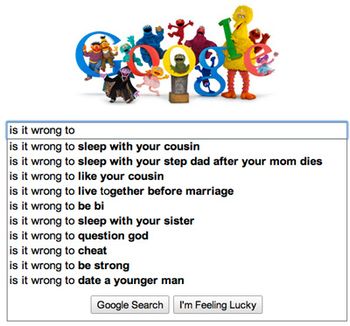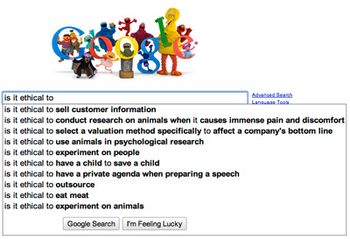When you type a query into Google it will suggest the most popular completions to the given prefix.
There are some remarkable contrasts, Slate found, between "dumb" searches and "smart" ones. People who start their search "how 2" are more likely to search "how 2 get pregnant" or "how 2 grow weed." People who start their search "how one might" are more likely to search "how one might discover a new piece of music" or "how one might account for the rise of andrew jackson in 1828."
The most fascinating contrast is between "is it wrong to…" vs. "is it ethical to." One change in word generates very different suggestions.
"Is it wrong to…" generated the following suggestions:
Whereas "Is it ethical to" generated the following:
###
Someone once told me that there is nowhere we are more honest than the search box. We don't lie to Google. Period. We type in what we're thinking — good, bad, and ugly. There's probably no piece of information that would better show what's on someone's mind than their stream of searches.


Oh yeah Ben, that search box *candor* is quite some insight – never thought about it in that dimension. (Now I recall all the creepy queries I’ve punched in just to check if I were the first with it, but was totally disappointed by the prompts that vouched many have gotten there before 😉
Excellent stuff. Try looking up “How to get away with…” It’s a catalog of the deadly sins.
In interesting fact I just discovered…when I typed in “naked” and “sex” there was no autosuggestion. Censorship?
I’d say this has a lot to do with the level of eloquence of the searcher.. people who would naturally search using words like “ethical” probably aren’t considering sleeping with their cousin
dude, you have just lifted this from Slate!
or don’t need Google to tell them whether its OK or not.
Ben,
Very interesting post. I definitely agree that the search box reveals what you are thinking about. I’d be interested to see some age/sex statistics showing what different demographics search for.
-Brian
Slate is the first link in the post.
Only overlap I saw between the “Is it wrong to…” above and suggestions for “Is it weird to…” was “date your cousin” (similar enough to “like your cousin”) My favorite “Is it weird to…” was “shave your pubes”
Note: We just typed in “where do ” and got results like “babies come from” and “fruit flies come from”. We also got (creepy) “the jonas brother live”.
Spell check doesn’t work on blog post titles?
Just too many results. You have to be more specific.
Yeah, it’s fodder for endless amusement:
http://www.somethingawful.com/d/weekend-web/aol-search-log-3.php
Or for repurposing into flarf:
http://finallyathoughtortwo.tumblr.com/post/158672689/flarf-with-a-twist
(disclosure: link is my site)
Good blog — I like the various DFW quotes….
I think your article raises interesting questions about intellectual honesty. While i am not trying to call this dishonest, I wonder if putting a link on a cited article (as you did to Slate) is the same as citing them by name–especially when the material covered is nearly identical.
I’m fascinated that number two on the “is it wrong” list is “sleep with your step dad after your mom dies.” Can that really come up that often? Or maybe it’s a macabre hypothetical…
I just updated the post to make it extra clear, plus I fixed two other
typos.
I think the search results have more to do with the popularity of the pages that contain that phrase than the sheer number of searches.
I suspect some of those “is it ethical” ones are students looking for answers to college philosophy essays.
The suggestions are also regionalised, try comparing google.com and google.co.uk for example.
Whoa… just tried “why are” and got quite a few race-specific suggestions: “Why are all the black kids sitting together in the cafeteria” and “Why are black people so loud”… scary!
Meanwhile, “what are” is a hilarious one to try, as it produced as it’s first suggestion(!) the phrase “What are these strawberries doing on my nipples i need them for the fruit salad”
That. Is. Awesome.
I’m collecting Google auto search stuff on this tumblr.
Those are both books.
“There’s probably no piece of information that would better show what’s on someone’s mind than their stream of searches.”
This is why the saving of search history is so dangerous. Overzealous government agencies can cast a wide net to suss out “intent”.
There are a lot of people out there that deliberately bomb Google with bogus searches, for the sole purpose of generating “funny” completion suggestions. Try: “why won’t”.
The people typing “is it wrong” are going to do the thing. The people typing “is it ethical” are looking for the answer to their term paper.
Maybe not….all of these people married cousins (of some sort):
Einstein, Darwin, FDR, Bach, H.G. Wells, Thomas Jefferson, Edgar Allen Poe, John Adams, Edvard Grieg, Oliver Wendell Holmes, Igor Stravinsky, Martin Van Buren, et al., et al…
Go to google and begin to search for “why won’t”.
Hilarity ensues.
“Is it ethical to experiment on humans” yielded results just as poor as “Is it wrong to experiment on humans”
The real answer is stop using Google search as your primary source of information.
I think this is a new form of ‘Google Bomb’… the last example is actually an item for sale on Amazon.com.
To me the most interesting part of the post that I had never thought about was “We don’t lie to Google.”
Imagine the amount they could tell you (or other people) about yourself if everything was tracked and analyzed.
Back in 2006, AOL released search data for thousands of users, assuring everyone that privacy would be maintained. However, simple searches allowed people to aggregate search criteria and begin to form profiles of users.
A filmmaker made a series of videos using the search queries of user #791311 as voiceover.
It is interesting to see the progression of feelings and lifestyle as their searches are presented over time.
http://www.minimovies.org/documentaires/view/ilovealaska
i love collecting Google referrals to my blog, and I have to say the number of hits I get from people search for “strip tarot” is blinding
Those aren’t (all) search queries – some of them are obviously rhetorical questions. Maybe Google shows popular queries first, but it sure looks like if you enter something unusual it falls back on a list of questions they’ve found elsewhere. Maybe somebody else is feeding rhetorical questions into google but my guess is that google falls back on suggesting any question it can.
Given that, it’s impossible to tell for sure which suggestions are “honest” queries and which ones are just search results. Google may know everything but you’re not going to divine any of their secrets this way.
Google has a pretty complex user model, so if you aren’t careful you’ll find that you learn more about yourself from the provided prompts than you learn about others.
Perhaps these prompts are actually telling us that some people spend too much time searching for bawdy things in their search engine of choice?
That’s largely the point..
The level of eloquence probably does play a role, although I’d also guess the negativity versus positivity of the phrasing plays a large role as well.
Would love to see the contrast between something like these for contrast:
“Is it wrong to” and “Is it right to”
“Is it unethical to” and “Is it wrong to”
Very interesting. I face this dilemma alot while trying to find information on Google. I got tired of getting useless results and changed the wording I use in my searches. For instance; starting a sentence with ‘how should’ versus ‘how might’ generates totally different search results.
fascinating. what are the social implications of this? is google prejudiced against people who use poor grammar?
I still wonder if google is looking on number of appearences of the particular keyword in a page for deciding page relevance to the search term, it’s ridiculous duds…
Yea is funny some of the most popular search. I typed in how to and the one of the top ones was ‘ How to kiss’
Thanks alot for sharing this with us, was a really interesting post.